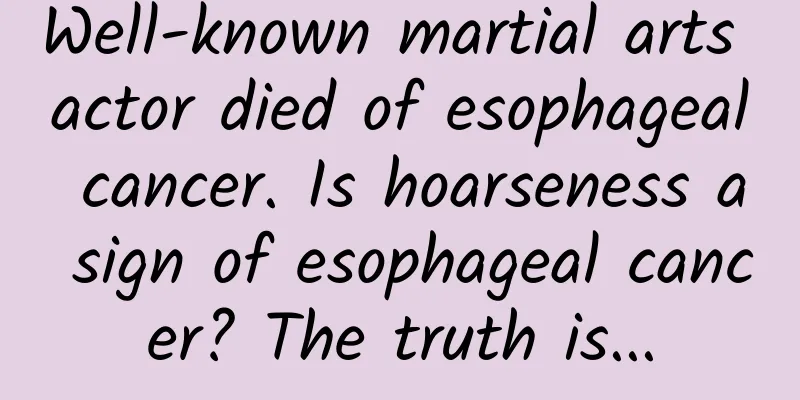Well-known martial arts actor died of esophageal cancer. Is hoarseness a sign of esophageal cancer? The truth is...

|
Recently, the news that "Martial arts film star Xu Shaoqiang passed away in Beijing in early September due to esophageal cancer" has become a hot topic. He was 73 years old and played many roles that impressed the audience. So what is esophageal cancer? Image from Phoenix.com Esophageal cancer is a malignant tumor originating from the epithelial cells of the esophageal mucosa. There are two main histological types: squamous cell carcinoma and adenocarcinoma. Squamous cell carcinoma is the main type in my country. At present, the incidence and mortality of esophageal cancer in my country account for more than half of the world's total, and prevention and control work remains severe. Perhaps because of this, there are many methods of "self-testing" for esophageal cancer circulating on the Internet. So, are these online identification methods true? What are the risk factors for esophageal cancer, and how to prevent it correctly? Let's take a look! Misconception 1: Eating hot pot frequently can easily lead to esophageal cancer? This is not very rigorous. Hot pot is just a way of cooking food, not a cause of esophageal cancer. The habit of eating overheated and scalding food is a high-risk factor for esophageal cancer (the most suitable eating temperature is 10℃~40℃). The hot pot should not be blamed. So, why is scalding food so harmful? Many friends have the habit of "eating and drinking while it's hot", but the esophageal mucosa is relatively tender and can tolerate a maximum temperature of 50℃~60℃. When the esophagus comes into contact with food that exceeds the safe temperature, the esophageal mucosa will be burned. Copyrighted stock images, no reproduction is authorized If you are only burned occasionally, you will recover quickly. However, if the esophageal mucosa is burned repeatedly, such long-term and continuous stimulation may cause lesions in the mucosa, from superficial inflammation and ulcers to malignant hyperplasia, increasing the risk of esophageal cancer. Since eating too hot food (including drinking very hot water) for a long time is very harmful, the World Health Organization has classified very hot beverages (drinking) above 65℃ as Class 2A carcinogens. Therefore, when eating hot pot, you might as well let the ingredients cool in the dipping sauce for a while. Myth 2: Often choking when eating steamed buns Does it mean it is early stage esophageal cancer? This is not the case. There are many reasons for choking when eating steamed buns. It may be caused by malignant diseases of the esophagus itself, such as esophageal cancer; but it may also be caused by lesions of tissues around the esophagus, such as lung and mediastinal tumors, aneurysms, goiters, etc., which can cause esophageal stenosis by compressing the esophagus from the outside; and some benign esophageal diseases can also cause esophageal stenosis. It is one-sided to rely solely on "choking on steamed buns to self-diagnose esophageal cancer". Gastroscopy (which passes through the esophagus) and biopsy for pathological examination if necessary are required. In fact, the typical symptom of esophageal cancer is progressive difficulty in swallowing. First, it is difficult to swallow solid food, then semi-liquid food, and finally water and saliva cannot be swallowed. However, most patients with early esophageal cancer do not have the feeling of "choking on steamed buns". Most patients who have this symptom are already in the middle and late stages, and they may not even be able to drink liquids. This often indicates that the esophageal stenosis caused by esophageal cancer is already very serious. Therefore, it is unreliable to self-diagnose esophageal cancer by choking on steamed buns, and it is impossible to detect early esophageal cancer in time. However, if you choke frequently, you may wish to go to the hospital for a check-up to find out the cause. Myth 3: The voice becomes hoarse Does this mean you have esophageal cancer? This statement is too absolute. The recurrent laryngeal nerve, which originates from the vagus nerve, is distributed in the muscles of the larynx and is involved in controlling normal voice production. Hoarseness is related to the damage to the recurrent laryngeal nerve. Although hoarseness may be a sign of esophageal cancer, damage to the recurrent laryngeal nerve caused by any reason can cause hoarseness. Diseases that can cause hoarseness include: 1. Benign diseases of the larynx: including acute and chronic laryngeal inflammation; 2. Malignant diseases of the laryngopharynx itself; 3. Certain malignant tumors of the neck and chest, such as thyroid cancer, esophageal cancer, lung cancer and mediastinal malignant tumors. The esophageal cancer lesions themselves and the metastatic lymph nodes can directly invade or compress the recurrent laryngeal nerve, causing hoarseness. Therefore, if hoarseness occurs, the possibility of esophageal cancer should be considered, but there is no need to panic. You can go to the hospital to find out the cause of the hoarseness. Myth 4: If esophageal cancer cannot be treated with surgery Does that mean there is no hope? Although many esophageal cancer patients are already in the middle or late stages when they seek medical treatment and have lost the opportunity for surgery, it is still too pessimistic to say that there is no hope. The treatment of esophageal cancer has adopted a comprehensive approach including surgery, chemotherapy, radiotherapy, targeted therapy and immunotherapy. Copyrighted stock images, no reproduction is authorized If esophageal cancer patients undergo comprehensive and standardized examinations and are confirmed to be in the local advanced stage, and no metastasis to the brain, bones, lungs, liver and other organs is found, and further evaluation by doctors finds that the patient's general physical condition is relatively good, that he is not elderly, and that he does not have serious medical diseases, then radical radiotherapy can be considered if surgery is not possible or difficult to tolerate. (Depending on the extent of the patient's lesions, chemotherapy can be chosen at the same time, or chemotherapy can be given after radiotherapy, and sometimes chemotherapy is given first. Radical synchronous radiotherapy and chemotherapy are recommended for inoperable locally advanced esophageal cancer.) There is still a possibility of clinical cure. Radiotherapy, like surgery, is a local treatment, and side effects are mostly limited to the irradiation field. When formulating the radiotherapy plan, doctors and physicists have fully evaluated and weighed the pros and cons, and side effects are generally within a controllable range. In a word, esophageal cancer cannot be cured by surgery. It can be seen that even if esophageal cancer patients have a relatively late stage of disease and have lost the opportunity for surgery, there are still other treatment modes that are suitable for their specific conditions. Comprehensive treatment with radiotherapy as the main treatment can also achieve the goal of controlling the disease. Radical synchronous chemoradiotherapy is the standard treatment for patients with inoperable locally advanced esophageal cancer. Systemic drug therapy (chemotherapy, targeted and immunotherapy, etc.) and best supportive treatment are recommended for patients with extensively advanced esophageal cancer, which can minimize pain, improve quality of life and strive to prolong survival time. What are the symptoms of esophageal cancer? Having said the misconceptions about esophageal cancer, let's talk about the symptoms of esophageal cancer that we should be alert to. First of all, we must emphasize that the gold standard for diagnosing esophageal cancer is still endoscopy and pathology. The following symptoms are just to remind us to be alert to the possibility of esophageal cancer and further examination is needed to confirm the diagnosis. First, let's talk about the early signs of esophageal cancer. If the following symptoms appear, you need to pay attention: 1. After eating, there will be a feeling of choking, tightness in the throat, and a foreign body sensation in the esophagus; 2. When swallowing dry or rough food, there is a feeling of dryness and urgency in the throat; 3. When swallowing food, the food passes through the esophagus slowly and is accompanied by a feeling of retention; 4. When swallowing food, there is a feeling of stuffiness or pain behind the sternum. One symptom that needs to be emphasized again here is that patients with esophageal cancer will first have difficulty swallowing solid food, and then develop difficulty swallowing liquid food. This is also the most typical symptom of esophageal cancer and the reason for frequent visits to the doctor. This symptom is called "progressive dysphagia" and is a manifestation of symptoms of mid-to-late stage esophageal cancer. Dysphagia will only occur when the mucosa of esophageal cancer is diseased and the lesions invade 2/3 of the esophagus. Therefore, we should pay attention to the early signs of esophageal cancer mentioned above and not just look at whether there is choking or not, so as to avoid esophageal cancer from progressing to the mid-to-late stage. How to prevent esophageal cancer First, high-risk groups should be screened regularly. According to the "Guidelines for Screening, Early Diagnosis and Early Treatment of Esophageal Cancer in China (2024)", high-risk groups for esophageal cancer are those aged ≥ 45 years and meet any of the following conditions: 1. Living in areas with a high incidence of esophageal cancer (defined by county-level administrative districts); 2. First-degree relatives such as parents, children, and siblings have a history of esophageal cancer; 3. People with bad eating habits and lifestyles, such as hot and spicy food, high-salt food, pickled food, smoking, heavy drinking, etc.; 4. Patients with chronic esophagitis, Barrett's esophagus, esophageal diverticulum, achalasia, reflux esophagitis, benign esophageal stricture, etc. 5. Have a history of diagnosis and treatment of esophageal precancerous lesions. Copyrighted stock images, no reproduction is authorized In addition, we must especially emphasize the harm of drinking. When alcohol passes through the esophagus, it will directly and strongly stimulate the esophageal mucosa. Long-term heavy drinking will cause abnormal proliferation of the esophageal mucosa, thus inducing cancer. In addition, alcohol metabolites such as acetaldehyde also have certain carcinogenicity. According to the latest 2022 edition of the "Dietary Guidelines for Chinese Residents": "Calculated by alcohol volume, for adults, the maximum amount of alcohol consumed per day is recommended not to exceed 15g. Alcohol in any form is not good for human health." Therefore, it is recommended that everyone drink less if possible, and not drink if possible. Author: Hu Zhongdong, Healthy China Action Spokesperson, Associate Chief Physician, Registered Nutritionist, Health Manager Review | Pan Zhanhe, Chief Physician, Master Supervisor, Department of Oncology, Zhongshan Hospital, Xiamen University |
>>: Twinkle, twinkle little star, the sky is full of "little" stars
Recommend
Is AI’s “knowing people by their tongues” a waste of money?
Produced by: Science Popularization China Author:...
What does Doraemon, who has big buck teeth, hide in his pocket?
Australia is a magical land. There are kangaroos,...
The latest notice on the lifting of the lockdown in Shanghai Pudong in 2022: Has it been lifted? Which areas have been unblocked?
Starting from 5 a.m. on February 28, the Pudong N...
Unexpectedly, "burping and farting" can also affect carbon emissions
What are bull farts and why should we collect the...
Today I have hyperthyroidism, tomorrow I have hypothyroidism, why is the thyroid gland so delicate?
Audit expert: Qu Bo Chief Physician of General Su...
A look at the logic of Xiaohongshu's homepage recommendation algorithm from the perspective of popular notes
As an operator, I have always been paying attenti...
How to write a popular short video title!
In life, many people want to learn, so they study...
Tips for setting up a GuangDianTong information flow account!
How to choose from so many slots? How can we achi...
Satellite cloud images help you understand the weather: "Northeast Cold Vortex" is in the shape of a vortex! Does "arc-shaped cloud line" mean severe convective weather?
Northeast Cold Vortex The Northeast Cold Vortex i...
With only 20 people, how did they manage 20,000,000+ users?
In this article, Pocket founder Nate Weiner share...
Chicken soup is poisonous: Don’t let other people’s experience kill you when operating a public platform
With 549 million monthly active WeChat users and ...
Why can a can that can’t be opened be opened by tapping the bottom?
Do you like to eat this kind of canned fruit in g...
How to make a popular short video on Tik Tok? How to shoot high-quality Tik Tok short videos?
The fastest way to increase followers on Douyin i...
Tiye Duck Duck 2nd iPad Illustration Class
Course Catalog ├──Courseware+color card+brush | ├...









